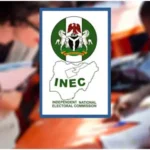The Independent National Electoral Commission (INEC) has sworn in 19 newly appointed Resident Electoral Commissioners (RECs) ahead of the 2023 General Elections.
President Muhammadu Buhari in July this year, transmitted the names of the 19 RECs nominees to the Senate for confirmation, before the upper chamber on October 5 confirmed their nominations despite protests.
Five of the 19 were returnees for their second and last five-year tenure.
Those whose tenure were renewed were Ibrahim Abdullahi (Adamawa), Obo Effanga (Cross River), Umar Ibrahim (Taraba), Agboke Olaleke (Ogun) and Professor Samuel Egwu (Kogi).
The 14 others on fresh five-year appointment were Onyeka Ugochi (Imo), Muhammad Bashir (Sokoto), Prof. Ayobami Salami (Oyo), Zango Abdu (Katsina), and Queen Agwu (Ebonyi).
Others were Agundu Tersoo (Benue), Yomere Oritsemlebi (Delta), Prof. Yahaya Ibrahim (Kaduna), Nura Ali (Kano), Agu Uchenna (Enugu), Ahmed Garki (FCT), Hudu Yunusa (Bauchi), Prof. Uzochukwu Chijioke (Anambra) and Mohammed Nura (Yobe).
Speaking at their swearing in, the INEC Chairman, Prof. Mahmood Yakubu, said each of the RECs brings to the commission knowledge and experience in various fields.
According to him, in terms of professional background, nine were from the academia, including professors; two lawyers; an accountant; a retired Ambassador and six civil/public servants, including retired Permanent Secretaries.
“As I welcome you to the commission, I urge you settle down quickly and familiarise yourselves with the demands of your new responsibilities, always bearing in mind our commitment to free, fair, credible, transparent and verifiable elections.
“With exactly 113 days to the 2023 general election, we are aware that the task ahead of us is not easy but we must never disappoint Nigerians. Our loyalty is to Nigeria and our allegiance is to Nigerians. Only their votes should determine winners in the 2023 General Election. Nothing more, nothing less. There should be no deviation from this path of honour and integrity.
“Over the years, the commission has worked tirelessly to reform the electoral process and introduce many innovations that are generally acknowledged to have improved the electoral process. In doing so, we will continue to acknowledge the sacrifice and dedication of our hardworking staff.
“As you are deployed to the States of the Federation, you will be responsible for human and material resources. Work with the staff and be guided by the provisions of the law and our various Regulations and Guidelines,” Yakubu said.
Warns them against being visitors to govt houses
The INEC boss said that the new RECs would also interact with various stakeholders as they should maintain the established practice of consultation with them.
He, however, warned that in dealing with the general public, they should be guided by the provisions of the commission’s Code of Conduct.
“You should not be visitors to government houses and must never hold unofficial meetings with politicians, even after official working hours. All matters pertaining to official responsibilities should be conducted in the office attended by the relevant staff and properly documented. This is your best protection against mischief. Do not compromise the neutrality of the Commission or create the perception of partisanship.
“In discharging your responsibilities, you must at all times be transparent and non-partisan while remaining firm and courageous. You owe nothing to any individual but owe everything to the Nigerian people.
“We must continue to ensure that the choices they make on Election Day prevail. It is their decision. We are only administering the process in trust supported by technology. On this note, let me once again emphasise that the only means of voter accreditation during the 2023 General Election is the Bimodal Voter Accreditation System (BVAS) while results will be uploaded to the INEC Results Viewing Portal (IReV) in real-time on Election Day as provided by law,” Yakubu said.
He also said that in line with the commission’s current practice, RECs are deployed to states within their geo-political zones, but that no one will serve in his/her state of origin throughout their tenure.

 Join Daily Trust WhatsApp Community For Quick Access To News and Happenings Around You.
Join Daily Trust WhatsApp Community For Quick Access To News and Happenings Around You.

